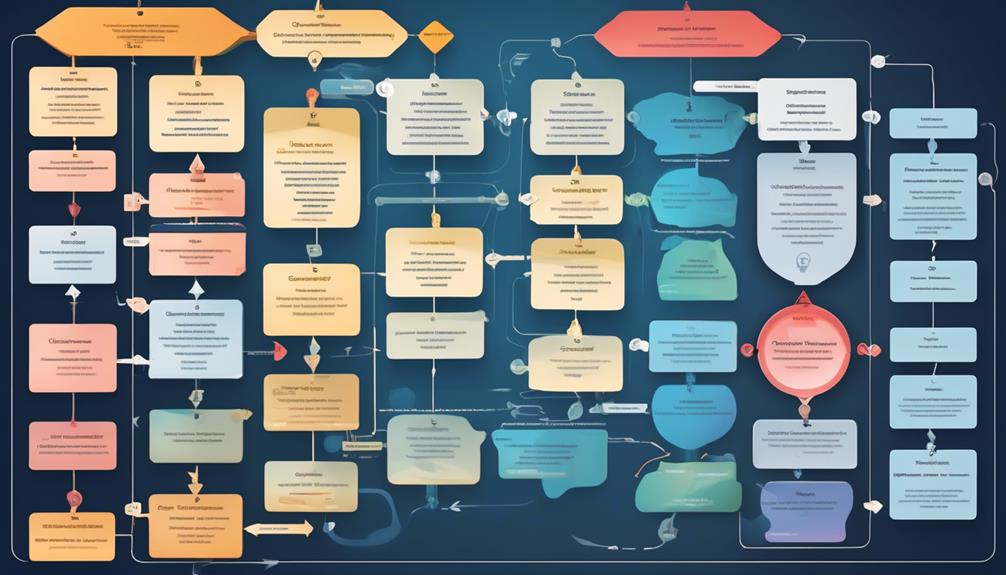Mastering Software Quality Assurance (SQA) in Agile methodologies requires more than simply following procedures; it demands a deep understanding of Agile principles and innovative strategies that greatly improve the effectiveness and quality of software development processes.
As someone who has experienced the challenges of implementing SQA in Agile firsthand, I've come to realize that the key to success lies in embracing a proactive approach and leveraging the expertise of QA professionals throughout the entire Agile process.
But what are these best practices, and how can they be effectively implemented to achieve optimal results?
Key Takeaways
- Embrace flexibility and collaboration in Agile methodologies
- Prioritize iterative development for quicker delivery
- Test automation and manual testing efforts should be prioritized in Agile QA
- Continuous improvement and adaptability are essential in Agile test planning and methodology
Understanding Agile Methodology
Understanding the Agile methodology involves embracing flexibility and collaboration to adapt to evolving requirements and deliver high-quality products. Agile methodologies prioritize iterative development, cross-functional teams, and continuous feedback. In Agile, software development and testing occur simultaneously, with a strong emphasis on collaboration between development and QA teams. This collaborative approach ensures that potential issues are identified and addressed early in the development process, leading to higher quality deliverables.
Agile methodologies also emphasize the importance of involving QA teams from the project's outset. By integrating QA into the development process early, Agile teams can identify potential risks, assess feasibility, and influence project direction. This early involvement enables QA teams to contribute to testing strategies and the creation of Agile-specific test cases. Additionally, iterative testing in Agile allows for continuous improvement, ensuring that any defects are promptly identified and reported, ultimately leading to the delivery of high-quality software products.
In mastering SQA in Agile environments, it's crucial to recognize the fundamental principles of Agile and how they shape the collaborative development and testing processes. This understanding forms the foundation for implementing effective SQA practices within Agile methodologies.
Advantages and Disadvantages of Agile

Agile methodologies offer numerous benefits, including enhanced stakeholder satisfaction and more efficient resource utilization, leading to increased customer satisfaction and faster feedback loops.
However, there are also potential disadvantages to consider, such as the need for a cultural shift and the risk of scope creep, which can pose challenges in Agile implementation and lead to increased project costs.
It's essential to weigh these advantages and disadvantages to understand the impact of Agile on delivery time and overall project success.
Advantages of Agile
How can Agile methods enhance stakeholder satisfaction, resource utilization, and bug detection? Agile practices in software development projects offer numerous advantages, including continuous feedback, improved user satisfaction, and efficient resource allocation. By integrating Agile QA processes, quality assurance becomes a continuous practice throughout the development lifecycle, ensuring early bug detection and prompt issue resolution. Stakeholders benefit from increased visibility into the project's progress, leading to higher satisfaction and better alignment with their expectations. Additionally, Agile testing practices facilitate collaboration between testers and developers, resulting in higher-quality deliverables and timely release of products or applications. The table below summarizes the advantages of Agile in software development projects.
| Advantages of Agile in Software Development Projects |
|---|
| Continuous feedback and improvement |
| Enhanced user satisfaction |
| Efficient resource utilization |
| Early bug detection and resolution |
Disadvantages of Agile
The benefits of Agile methodologies in software development projects are compelling; however, it's important to acknowledge the potential drawbacks that can impact project management and delivery.
In mastering SQA in Agile environments, we must be aware of the disadvantages of Agile. The potential for scope creep in Agile projects challenges project management and delivery, while the cultural shift required for Agile adoption may pose resistance within the organization.
Agile budgeting can be challenging due to the iterative and evolving nature of projects, and over-reliance on Agile methodologies may lead to neglect of essential documentation and planning.
Furthermore, Agile may struggle to accommodate large-scale, complex projects with extensive dependencies and regulations.
Understanding these disadvantages is crucial for ensuring effective development and QA teams in an agile environment.
Impact on Delivery Time
Enhancing delivery efficiency and adaptability, Agile methodologies offer both advantages and disadvantages in managing project timelines. When considering the impact on delivery time in Agile environments, several factors come into play:
- Iterative Nature: Agile's iterative approach allows for quicker delivery times by enabling continuous development and adaptation to changing requirements.
- Early Bug Detection: Agile testers can detect and address bugs earlier in the process, reducing the time spent on fixing defects later and positively impacting delivery time.
- Scope Changes: However, frequent changes in requirements and scope in Agile may lead to potential delays in delivery, impacting project management and QA processes.
Understanding these dynamics is essential for mastering SQA in Agile environments and implementing best practices to optimize delivery time.
Agile Process Phases

When it comes to Agile process phases, sprint planning and daily stand-ups play a crucial role. These are key points of focus that drive the iterative and collaborative nature of Agile development.
Let's explore how these phases contribute to the overall success of SQA in Agile environments.
Sprint Planning
During Sprint Planning in Agile environments, early involvement of QA fosters better collaboration and identification of issues. This phase sets the stage for the QA process, where Agile practices emphasize the creation of test cases aligned with user stories. Collaboration between development and QA experts is crucial to ensure that test automation and manual testing efforts are synchronized.
The iterative nature of Agile necessitates that QA experts test each iteration and collaborate for issue resolution during the Execution phase. Furthermore, Sprint Planning provides an opportunity to prioritize the QA process and incorporate stakeholder feedback in the Continuous Improvement phase.
Daily Stand-ups
Initiating effective communication and collaboration, daily stand-ups in Agile environments serve as a pivotal tool for maintaining team alignment and addressing impediments. These meetings play a crucial role in Agile development, enabling teams to implement best practices and create a feedback loop for quick feedback.
For QA and development teams, daily stand-ups proactively address any potential obstacles, increasing customer satisfaction through improved communication and collaboration. By providing a platform for each team member to share their accomplishments, plans for the day, and any impediments, daily stand-ups ensure that everyone is aligned and focused on the sprint goal.
This daily synchronization fosters a culture of transparency and accountability, ultimately leading to more efficient problem-solving and progress tracking within the team.
Agile Test Plan and Methodology

Developing an Agile Test Plan and Methodology involves creating a high-level document that integrates business requirements and testing estimates for the project. As QA professionals, it's crucial to align the test plan with the Agile development cycle and principles. Here's how to approach it:
- Comprehensive Coverage: The test plan should encompass all facets of software testing, including the QA environment, testing scope, process, risks, dependencies, and entry/exit criteria. It's essential to ensure that the plan caters to the dynamic nature of Agile projects and promotes continuous improvement.
- Adoption of Agile Methodologies: Consider incorporating Agile test methodologies such as Test-Driven Development (TDD), Acceptance Test-Driven Development (ATDD), and Behavior-Driven Development (BDD). These methodologies emphasize collaboration and aim to enhance the quality of the software through iterative development and testing.
- Embracing Agile Principles: Embrace Agile principles such as flexibility, sustainability, and customer collaboration. The Agile Test Plan should reflect these principles by fostering a culture of continuous improvement, adaptability, and effective collaboration among cross-functional teams.
Benefits of QA in Agile

After establishing a solid Agile test plan and methodology, reaping the benefits of QA in Agile becomes evident in the stability and reliability of applications. Agile QA practices ensure that the software development process is streamlined and that the team can quickly address any issues that arise.
By integrating QA into every step of the project, teams can deliver robust, reliable, and tested code, reducing the risk of defects and enhancing the overall quality of the software. This proactive approach to QA addresses functionality, performance, and security issues early in the development process, ultimately reducing efforts, time, and costs.
Furthermore, the constant collaboration and flexibility in Agile enable teams to deliver innovative applications that meet the evolving needs of the market. Ultimately, QA in Agile environments enables the delivery of high-quality products, enhancing customer satisfaction and loyalty.
Test Automation in Agile QA

Test automation plays a pivotal role in enhancing the efficiency and effectiveness of Agile QA processes. Here's why:
- Faster Feedback:
- Automated testing provides rapid feedback to Agile teams.
- It allows developers and testers to identify and address issues early in the software development process.
- Time and Resource Savings:
- By leveraging automated tests for regression testing and load/performance testing, Agile teams can save time and resources.
- This is particularly beneficial for large projects with scale and complexity.
- Balanced Approach:
- Balancing between manual and automated testing based on project needs and complexity is crucial in Agile.
- While automated testing offers speed and repeatability, manual testing allows for exploratory testing and human intuition.
- Leveraging the strengths of both ensures comprehensive test coverage.
In mastering SQA in Agile environments, understanding the role of test automation and effectively integrating it into the QA process is essential for achieving the desired efficiency and quality. This requires careful consideration of test plans, testing tools, and the balance between manual and automated testing to ensure a robust QA process.
12 Best Practices for Agile QA

When it comes to Agile QA, it's crucial to consider the best practices for ensuring efficiency and quality.
Test automation strategies and continuous integration techniques play a vital role in streamlining the Agile QA process.
These practices not only enhance productivity but also contribute to delivering high-quality software in a fast-paced Agile environment.
Test Automation Strategies
In Agile environments, prioritizing and carefully automating test cases is essential to save time on regression testing and provide faster feedback to the development team.
To achieve mastery in test automation strategies for Agile QA, it's important to:
- Balance automated and manual testing based on project complexity and needs, ensuring optimal test coverage.
- Implement continuous integration and continuous delivery practices to streamline the delivery process, fostering a culture of continuous improvement.
- Utilize testing methodologies like TDD, ATDD, and BDD to enhance Agile testing, promoting collaboration between testers and developers.
Continuous Integration Techniques
Implementing continuous integration techniques in Agile QA requires a seamless automation of the build and test process with each code change. This approach enables Agile teams to integrate automated testing into the development cycle, ensuring immediate feedback on code changes. By utilizing robust test suites, developers and testers can catch defects early, contributing to continuous improvement in product quality.
Version control plays a crucial role in managing code changes and maintaining a consistent build process. Additionally, frequent and automated deployment of code changes is essential for upholding a stable and reliable product.
Embracing continuous integration practices fosters a responsive QA process, aligning with the dynamic nature of Agile development and promoting efficiency in delivering high-quality software.
Agile QA Process Challenges and Solutions

Navigating Agile QA process challenges requires a proactive approach and a commitment to fostering a culture of quality within the development team. In the dynamic development cycle of an Agile software development approach, the QA process faces several challenges. Here are some key solutions to address these challenges:
- Prioritize and Automate Test Cases: By carefully prioritizing test cases and automating them, Agile teams can save time on regression testing and ensure that critical functionalities are thoroughly tested within the constraints of tight project deadlines.
- Foster a Culture of Quality and Accountability: It's essential to promote a culture of quality within the development team. This involves early involvement of QA in the development and testing phases, ensuring that development and testing are working together seamlessly.
- Utilize Different Testing Approaches: Agile teams should utilize different testing approaches such as black-box and white-box testing to maintain consistency and adaptability in the QA process, enabling efficient identification and resolution of defects.
QA Roles in Agile

Collaborating closely with developers, testers in Agile environments continuously validate and test code to ensure high quality and reliability throughout the development process. In Agile, QA roles are integral to the team's success, emphasizing continuous improvement and collaboration.
Testers contribute to the development cycle by providing early feedback, ensuring test coverage, and proactively addressing potential issues and bugs. As a QA professional in Agile, I recognize the dynamic nature of QA responsibilities, where adaptability and interchangeability are key.
Testers and developers work hand in hand, leveraging Agile principles to deliver stable, accessible, and reliable applications. Our involvement from the outset enables us to identify and address potential challenges, fostering a proactive approach to quality assurance.
The iterative nature of Agile development necessitates a flexible and responsive QA role, focused on ongoing testing and collaboration. By embracing these principles, QA professionals can master their roles in Agile, driving the team towards high-quality, tested code and ultimately, successful project outcomes.
Benefits of QA Process in Agile

The effectiveness of the QA process in Agile environments becomes apparent through its early involvement and proactive identification of quality risks, leading to swift defect resolution and preventing the accumulation of issues.
This approach allows Agile teams to deliver high-quality software products by optimizing test coverage and making continuous improvements.
Additionally, improved collaboration and communication among developers, testers, and stakeholders foster a culture of continuous improvement, enhancing the efficiency of the Agile development process.
Agile QA process facilitates a faster feedback loop, providing prompt identification and rectification of issues, accelerating the development cycle, and enabling faster time-to-market for the product.
Furthermore, it allows testers to go beyond traditional testing roles, actively participating in Agile retrospectives, sharing insights and experiences for enhancement, and strategies to optimize test coverage and efficiency.
This active involvement not only ensures alignment with customer expectations but also enables early detection and resolution of defects, ultimately leading to increased customer satisfaction and delivery of higher-quality software.
Best Practices for QA Process in Agile

Ensuring early involvement of QA in the planning and execution phases is critical for influencing project direction and assessing the feasibility of solutions in Agile environments. Embracing best practices such as collaborative issue identification, Agile-specific test case creation, iterative testing, and effective defect identification is crucial for delivering high-quality results. To implement test automation effectively, it is essential to balance automated and manual testing based on project needs, prioritize and automate test cases carefully, and utilize continuous integration and continuous delivery practices.
Fostering collaboration and teamwork is key to the success of the QA process in Agile. Prioritizing team communication, holding regular meetings, and ensuring a culture of quality and accountability within the development team are essential. Moreover, continuous improvement is vital. Defining clear objectives, continuously monitoring and measuring the effectiveness of the QA process, and adapting the QA process based on feedback and lessons learned are essential for achieving customer satisfaction.
| Best Practices for QA Process in Agile |
|---|
| Early involvement in planning and execution phases |
| Embrace best practices |
| Implement test automation |
| Foster collaboration and teamwork |
| Continuously improve |
Frequently Asked Questions
What Is the Role of SQA in Agile?
In agile, SQA plays a pivotal role in ensuring high-quality software. Early involvement in planning, collaborating on issue identification, and creating agile test cases are key tasks. SQA experts provide insights into testing strategies and evaluate potential risks.
Embracing best practices ensures high-quality results. The agile testing process involves early and frequent testing, allowing faster bug detection, quick error correction, and timely product release.
SQA supports development and plays a crucial role throughout the software life cycle.
How Can QA Maximize Testing Coverage in an Agile Environment?
To maximize testing coverage in an agile environment, I ensure early QA involvement in sprint planning and user story refinement.
I implement Agile-specific test case creation and iterative testing processes, utilizing test automation to balance automated and manual testing.
Risk analysis, prioritization, and continuous improvement of the QA process are key.
Additionally, fostering a culture of quality and accountability, and conducting regular code reviews, helps to maximize testing coverage in an agile environment.
What Is the Role of QA in the Agile Environment?
In an agile environment, the role of QA is pivotal. I ensure high-quality products by providing insights into testing strategies, assessing feasibility of solutions, and evaluating potential risks early on.
This sets the foundation for a well-planned development process.
My involvement supports development, meets client specifications, and detects flaws, ultimately influencing project direction with a focus on delivering top-notch products.
What Is the Agile Method of Quality Assurance?
The Agile method of quality assurance involves integrating testing throughout the development process to ensure continuous improvement and early bug detection. It emphasizes collaboration, adaptability, and flexibility to meet evolving requirements.
Best practices in Agile testing include:
- Test-driven development
- Acceptance test-driven development
- Behavior-driven development
- Exploratory testing
- Session-based testing
This approach enhances stakeholder satisfaction and enables efficient resource utilization. However, it requires a cultural shift and may be susceptible to scope creep.
Conclusion
As we navigate the ever-changing landscape of software development, mastering SQA in Agile environments is like tending to a garden. By nurturing early involvement, collaborative problem-solving, and iterative testing, we can cultivate high-quality results.
Just as a gardener tends to their plants to ensure a bountiful harvest, embracing Agile methodologies and incorporating QA expertise throughout the process allows us to reap the fruits of our labor with consistently successful outcomes.









